Kate Bowler: I’m Kate Bowler, and this is Everything Happens. So one sort of strange and real fact about my life is that I spent a lot of my adult life researching televangelists and megachurches, and like, big kind of spiritual gatherings. And one of those kinds of gatherings is a miracle health service, where people, who are really desperate for a cure of some kind, will go and they will pray and hope and sing and expect that something will change. And, you know, well, there’s so much to say about that, but there was one form of miracle rally that I never quite got over. It was one that started really in England and popped up all over the United States and Canada. And I visited, when I was a teenager, one of their big churches in Toronto. And I continued to follow that church for like the next, wow, almost like two decades. They had actually been in perpetual revival, which is to say they got together every day since 1994. And they were part of this movement called, that started at the Toronto Airport Church, so-named, because it was, you know, near the airport. And one of the things they were famous for was dental miracles, miracles where a cavity, in particular, might turn to gold. And that if you’re not familiar with like very dramatic spiritual expectation, that might be like the weirdest thing you’ve ever heard. But for people who are like, into this kind of thing, or in the know, they may be like, “Oh yeah. That time where people believed in dental miracles.” And I was very curious as an adult researcher to go back to this place that had been in revival for decades then and ask the people who were there, “Hey, what happened to all that expectation? What’s it like to hope for like a miracle that you want, like a physical manifestation of, like something so intense that you can prove it’s there or not?” Like a, you know, like a dental miracle. So I went and interviewed the pastoral staff about what that was like. They said, “Oh, if you want to know that, you should go talk to our usher. He’s been there since the beginning.” So I was like, “Hey, what’s it been like expecting God to move in these really specific, visible ways?” And he said the sweetest thing. He was like, “Well, at first we used to try to film it.” And, you know, we’d have these cameras and we’d sort of try to sort of put it against people’s mouths. But, you know, people’s mouths are sort of dark inside. And it was it was hard to like, capture on camera. So, you know, here’s what I learned.” And he’s one of these you know, those like, when men get to a certain age and then they start kind of putting everything in their belt. Like a, like a, you know, like a pocket knife and the cell phone holder. And he reached into his belt and he pulled out this little pen flashlight. And he’s like, “You know, the cameras couldn’t, you know, see inside people’s mouths, so I, you know,” click, click. He turns the light on and he gave me a little wink and he was like, “So I guess that’s what I’ve always learned about miracles. When it comes to God, you know, you just always gotta carry a flashlight.” Whether I had, like any access to what really happened. I really found that that kind of stuck with me. What does it mean? Like, what is it like to live in expectation? What happens when you don’t get the miracle that you prayed for? And what happens when you do?
Kate: My guest today is someone who thinks really carefully about these two questions because her life and faith have been fundamentally changed by miracles, and by their absence. Steph Catudal is the author of a gorgeous memoir called Everything All at Once. And no, seriously, like my entire office passed it around until everyone had read it and wept and each tear stained page had been shared and joined by other people’s tears stained feelings. She is a beautiful writer and an even more spectacular person. Steph is also, not coincidentally, Canadian, so obviously we’re soulmates, and even though now we both live in the US with our families. And dear listener, she is one of us. She is someone who knows intimately, painfully, that life sometimes just happens and that we have to learn to live alongside all of that pain and that joy and that love that somehow coexists.
Kate: Steph Oh my word. It is such a joy to be talking with you today, finally!
Steph Catudal: Oh, my gosh. Thank you so much. I’ve been so looking forward to this. I was actually hoping I would get the email that you wanted me on your podcast, so I am so excited to be here.
Kate: Yay! Aw, well, I’m so excited. I, I wondered if we could start with—your husband, Rivs does a ridiculous sport. Like, he’s an endurance athlete, which means… So I’ve recently began running, so I can run for 12 to 21 minutes, so obviously very similar to what you’re about to describe to me. So tell me then, really, what does it mean to be an endurance athlete?
Steph: Yeah. He is, he is the epitome of an endurance athlete. I mean, he is, it’s not something he does. It’s who he is. You know, he wakes up at 4 a.m. and he’s out the door so he could run 2 to 3 hours before he gets the kids to school. And then, if after drop off, if he still has energy left, he’ll get on his bike and bike for a couple hours. It’s really his way of making sense of the world—movement, you know, and being outside.
Kate: It sounds like, too, the contract, the sort of contract between you is that he goes on these incredibly long runs, but then he always comes back. Until one day he just couldn’t finish his run. Would you mind taking me back to that season and just telling me what happened?
Steph: Yeah, it was late June of 2020, so kind of the height of the pandemic. And it was kind of awesome for endurance runners because they could go out on trails and in the Grand Canyon and know it was there. So they kind of had this freedom, you know. And so he and a friend decided to do, it’s called the Rim to Rim to Rim Run, which is, I think it’s 54 miles where you drop down into the Grand Canyon, run across it, run up it, and then run back down and out. Yeah, it’s pretty incredible. But it was kind of a routine run that he would do, You know, he could do it once a week during, you know, the spring and fall when it’s not too hot. So he went down on one of these runs with one of his friends and he kind of felt off along the way. But he didn’t think much of it. He just thought maybe his electrolytes were off or something. He got back down to the bottom of the Grand Canyon by the Colorado River and his heart started to race and he couldn’t catch his breath. And he felt that he was seriously in trouble and he didn’t know what was happening. And he just laid himself on a picnic bench and thought he was going to die down there. I had never seen him panic. And when he came back out the next day, he was in a state of shock, as though his body had failed him. Which, his body is his greatest ally, you know, he’s a, he’s an athlete. He’s a professional athlete. So, yeah, he made it out of the canyon. But that was the start of everything.
Kate: That’s so interesting to hear you describe it like that. Like his ability to trust his own body as being, like, key to who he is. And and you, you’re learning to trust your own intuition on the day where you left you know a sick and, claiming-to-be-constantly-recovering-insisting-he-was-fine Rivs behind when you went on a picnic with the kids and some friends. But you had this intuition.
Steph: A couple weeks after that, that canyon run Rivs, like, continued to decline. He he got more and more ill. He lost weight. He couldn’t get out of bed. And I was on my way to a picnic with my kids and my sister-in-law. And I was halfway there, halfway to the mountains. And I had this…basically it just felt like an awakening. And it was almost, it was like a whisper and and a shout at the same time. And it just said, “Go home and check on Rivs. And I, I pulled the car into a gas. Station and I had my sister-in-law following behind me and I just got out of the car and I said, “I need to go home. I know it sounds crazy, but I need to go home right now.” And she held me and she said, “It doesn’t sound crazy. That sounds perfectly logical, rational and true.” And so I went home and that’s when I found him passed out. And that was the first time that I learned to listen to myself. That was kind of the beginning of of my awakening, so to say.
Kate: When he didn’t want to go to the hospital, was it just because it was just such a scary time to be in hospitals? Was it was it mostly because of that, or was he just like had confidence that whatever he was going through, he could just kind of muscle through?
Steph: I think it was a lot of things. The main was that we live adjacent to the Navajo Nation and they are demographics that got hit the hardest by COVID because they their lack of accessibility to resources and stuff, sadly. And so the Flagstaff hospital was just like a hotspot and he didn’t want to take a bed from someone he felt needed it more. And that’s the truth. That was his main reason. He’s like, “You know, I’m otherwise healthy. I’m a physical therapist, so I know triage, I know the body. And so I feel like I could do this at home and then save that bed for someone who actually needs it, who doesn’t have the resources that I have.” And then on top of that was the fear of, if what he was experiencing, wasn’t COVID, the likelihood that he would catch COVID in the hospital was very high at that time too. So there’s a lot of things going into it that made him feel like I could just do this at home.
Kate: Ugh. Well then the state you found him, it must have been just terrifying to see him that way.
Steph: Yeah. Yeah, he was. Yeah, he was. He looked. He looked unalive when I saw him and it was really traumatic. But then he muscled through and I finally convinced him that evening to get to the hospital.
Kate: To give like a sense of context of your, like, the way you must have been thinking about it. I mean, you grew up Church of Latter day Saints, like what some people might know as Mormon. And I wonder, then what was the faith of your childhood like?
Steph: As a child, church and faith were easy to me, you know, it was…it felt warm. It felt comforting. My mom would bring us and we’d get cookies in church, and then, you know, my dad would have dinner, lunch waiting for us when we got home because he wouldn’t come with us to church. He was never a member of the church, but they had a really beautiful, understanding relationship where that kind of religious, uh, I don’t know, difference didn’t didn’t conflict in their marriage at all. It was really beautiful. But so I loved being Mormon as a child. It was easy, it was straightforward. And but when my dad got sick when I was 13 years old is when I started to deconstruct and question what I truly believed and what was true and what wasn’t for me.
Kate: Yeah.
Steph: Yeah. And a huge part of that was this notion of faith in miracles. I was led to believe that if I prayed and had perfect faith that my dad would be healed. You know, this very childlike x, y, z equation of, you know, faith and obedience equals miracle. And I really believed that because that’s kind of what we’re taught. We’re taught that. And and when my dad passed away when I was 14, I, I kind of said, well, if if faith and prayer and miracles aren’t true, then none of it’s true. None of it. And and that’s when I kind of started on my decade of rebellion.
Kate: I love the evil laugh. That’s so great. It’s actually one of the first things I ever taught my kid when he was little, was an evil laugh. Like it was like a two year old who could laugh like Vincent Price.
Steph: That’s amazing.
Kate: We’ll be right back.
Kate: Our stories are so compelling, like the seamlessness of the stories that we live inside are so compelling. And to have a dad with stage four lung cancer and then no framework for people who get sick and don’t get better. That must have been like, a totalizing world. Like, you either live inside that world or you don’t.
Steph: Yeah. Or conversely, when he did pass away, the rhetoric was, well, “He was called back to heaven, and it happened for a reason, and, you know, God needed an angel.” And all of the things that I know people say with good intentions and they weren’t trying to, you know, be malicious or vindictive. But those words, those platitudes killed me because I thought, what better place could my dad be in than here with me? And, you know, my mom and my brother and sister. And so that I think that kind of made me really, really have resentment towards religion and the church because it was all kind of encapsulated in this. Kind of telling me that I didn’t have to grieve because my dad died for a purpose. And so just don’t don’t be sad. You’ll be with him again. You know, you don’t be sad. And oh, my gosh, that was just that was really difficult to hear as a 14 year old.
Kate: Yes. That’s a very particular kind of poison.
Steph: Yes, it is. It is a very, yeah. And it lasts and lasts, you know.
Kate: Yes, it does. It really does.
Steph: Stays in the body.
Kate: You wrote this, um… There are so many things that I highlighted in your book, but one of the, something you said about that was, “I was full of hope, when I should have been steeling myself for death. I lived on one end of the pendulum, oblivious to everything in between.” And like, like the feeling, the feeling of just like, well, how, how stupid, how stupid do I feel when I like don’t, When no one prepares me, then when I have like nothing but my own sweet, you know, unknowing.
Steph: Yeah. And I felt… I blamed, misguidedly, blamed my mother for that for, you know, leading me to believe in this chance of a miracle. But then interestingly, when when my husband became sick and I had to lead my own children through grief, I realized what an impossible task it is to talk to kids about death and the possibility of death and illness. And it was this beautiful reckoning with her of realizing that she did—within the context of what she believed, she did the right thing. And it really was a yeah, it was just beautiful to see, and empathize with what she had to go through and all the things that I blamed her for as a child. I kind of understood better where she had been coming from, you know, and in having to deal with the same things with my own children.
Kate: Like. Like the… I’m just trying to think of the like, just the desire to reassure. Like, where does the edge, where are the edges of how we reassure the people around us?
Steph: Yeah. Yeah, exactly. And where where is the meeting between hope and reality? You know, where…where do those meet in the middle? Because I, I felt like I was constantly walking that tightrope with my three children when it looked like my husband wasn’t going to live. And, do I let them live on the edge of hope, only to be obliterated by reality like I had been, and then live in resentment like I had done? Or, you know, do I, do I say he’s going to die? And then they blame me when he does live. You know, I feel like there is there…it’s impossible. It’s an impossible task. And then we’re just kind of clamoring our way through in those moments.
Kate: Yes, right. That’s such a… Steph, you think about that so clearly. I love your brain on this because it’s, um… The precision of what you’re trying to do there is—I find my brain breaks on it sometimes.
Steph: Oh, me too.
Kate: The language of certainty I find to be really painful, totalizing, ignorant, you know, sometimes. If it’s just use as a weapon: “this is exactly what’s going to happen” when none of us can predict the future, right? Absolutely. And like a lot of the language that I used to have for faith doesn’t feel at all like certainty anymore. But when, like. You can say the same thing almost like the exact same sentence, like, “It’s going to be okay,” or, you know, and that kind of just be a language of love like and a prayer, “Please, God, help this be okay.” And hope. Okay, well, whatever this is going to be, we’re going to we’re going to figure it out as we go. Like, it’s it’s so hard when the exact same thing, the air can, like, take us right to the edge of hope, but we’re just trying not to let it push us beyond it?
Steph: Yeah, well, that’s so interesting you say that because it’s true. I think what I realized is we’re all saying the same thing. It’s just semantics and it’s just the intention behind what we’re saying. And what you know, I have a really hard time with certitude, just like you. I’m like, “Please, don’t.” How do we know? How could we know?
Kate: Please don’t hurt me with this.
Steph: Please don’t. Yes, please. But I think the most…closest I felt to faith or spirituality was when I could accept the liminality of all of it and accept that nobody knows and how beautiful that is, because it means that anything’s possible, you know, good or bad, positive or negative. I love living in that space of possibility and when someone tries to pigeonhole or be myopic about truth, that to me is it is a total… I can’t trust you when you say that you found the truth, you know, because it means that you’re not open to the rich realities that are around us. And the varying realities. Because anything is possible.
Kate: Well, the in-betweenness is so, so painful and so and so beautiful for like a sec. For a second. You can like you can never stick the landing, I find. But like, I just wonder. I think the language is like grace ,when we can extend to others, like a kind of, like compassion that we can’t totally imagine but we can see love inside of. And when you talk about your mom, it feels like there’s such a grace there for how her desire to will your dad into perfect health was a was a form of love. It was a it sounds like it was a painful form of love.
Steph: Mm hmm. Yeah. Everything that she did was out of love. And that’s, that is something that I’ve realized over the years that every every prayer, every, you know, family circle prayer, every fast. On Sundays, we’d fast for his health. I in my teens. I saw those as just those those things always made me mad because I felt like they were just like false, false hope. That was just more false hope. And we were just doing this pageantry to try to, you know, save my dad and and that it was all false. But now I see it all as acts of love. And then in my grief, in those years of grief after my father died, the freedom she offered me to express my pain and sadness in the destructive ways that I chose to—maniacal laugh again, ha ha—that was love, too. I think she looks back sometimes and feels like she gave me too much freedom, and, or did she abandon me or, you know, just let me go? But that’s exactly what I needed. And that was, she loved me enough to be able to to explore my anger and my grief in the ways that I needed, which I think is very hard to do now that I have a teenage daughter. I’m like, how did you not just lock me in my room? And you know what I mean? Like, how did you let me just go and be what I needed to be? And that was one of the greatest acts of love that I’ve ever, you know, witnessed. Truly. And all of these things, they are only things that I’ve seen now in the past few years. These aren’t things that were clear to me, you know, as a teenager or even as a young mom. It’s only in and going through something similar, very similar to what she went through, that I’m able to see all of these things. And that’s been one of the greatest gifts of this whole experience. You know, if I could pick up the gems. This is one of them, is this really seeing my mother in her fullness.
Kate: There is this one line that I underlined a million times that you said about, you said, “What a blessing and a curse to learn in an instant that pain is the intercessor of empathy.” What!? That so perfect. And I know there’s all kinds of people in complicated relationships in this lovely listening community that we have that like can find a lot of hope in that, that like sometimes there’s just a doorway we haven’t walked through yet in which we then maybe on the other side can see each other’s love more clearly.
Steph: Mmmhmm, absolutely.
Kate: Would you walk me back to that first moment where you take Rivs to the hospital and you have to leave him there because they didn’t let anybody stay. But at that moment, you have to have imagined it would just be like, a little bit. Like, I’ll see you later. As opposed to what it became.
Steph: I never really thought anything could seriously be wrong. And when I dropped him off at the hospital, I really did think it was going to be a couple of days. I thought, you know, we assumed he had COVID because that’s what all signs were pointing to. He had a cough, he was tired, cold chills, all those things. And so I dropped him off thinking I’d pick him back up in a few days, not knowing. Yeah, I think it was…well, I saw him a few weeks later, but I wouldn’t see him awake again for like three and a half months.
Kate: Oh, love.
Steph Catudal: Yeah, he was in there for two weeks and they didn’t know what was wrong. They kept doing different tests, they thought he had the bubonic plague at one point, that he had a fungal infection, and they really couldn’t understand what what was happening.
Kate: Because he’s 35, healthy, the world’s most athletic person.
Steph: Yeah, yeah and other than he had no platelets and a weird white blood count, but other than that, everything looked pretty good. But two weeks after getting to the ICU is when he started to go into true lung failure. And and after that, things went downhill really fast. That’s when he was put on the ventilator and sedated. And I kind of feel like, when, without the conscious fight that he has innately in him is when things started to really go downhill because he was just, you know, asleep. And then things were being, he was being acted upon, but he he wasn’t consciously aware and able to advocate for himself or anything like that.
Kate: So what was the specific diagnosis that he ended up getting?
Steph: It was NK/T-cell lymphoma, which is really rare, but it’s even more rare, I think only ten people have ever had the presentation that he does where it’s only in his lungs. So usually people have it in their nasal or in their larynx or in their faces, these tumors, but his were just only in his lungs. Yeah. Which is such a weird, you know, cruel irony is what we keep saying. So it’s like, you know, you built your whole life on, lungs and breath and running. And somehow the cancer finds its way there.
Kate: Was there like a surreal familiarity with it? Coming back to cancer? I mean, you’d had so much, you just had so much cancer in your life by that point.
Steph: Yeah. Yep, my little brother had Leukemia when I was six and he was three. And then my dad, of course, and then my older brother had testicular cancer, but didn’t tell us because he didn’t want to scare us. So every male in my family has had cancer. When, when I finally got the diagnosis of it being cancer, it did feel familiar. And it almost felt in some way a comfort because first of all, I, I had done cancer before. I knew what to expect. More or less, I knew what it looked like. It felt familiar. And then on the other hand, it was just, I was relieved to get a diagnosis at all because it was looking like he was going to die without a diagnosis, which really felt it… It didn’t feel, I hate the word fairness too, but it didn’t feel, like, how could you? How could you, how could they not figure out what’s wrong with him? Because then it would mean that there’s no hope at all because they can’t treat him. So once we at least had a diagnosis, even though they said there was no hope, I felt there was a chance for a way forward. And that’s when I kind of kicked into action.
Kate: It does sound like you like found your footing in that, in a way that, I mean, very few people would have rallied the way that you did. It sounds like he had amazing nurses, but also that it was going to take a…I mean, an uphill, steep sprint in order to even get any other medical options on the table.
Steph: Yeah, well, we were really, really fortunate that he because of his career as an athlete, he had a lot of people around the world that were aware of him. And and so I kind of battled with this guilted privilege of being able to access resources to medical facilities and doctors when I knew a lot of people around the country were dying of COVID and not getting a bed and not getting a ventilator, and but I did I reached out online and asked if anyone was able to transfer my husband to a different hospital because the one he was at wasn’t able to treat him. They said they were done with what they could do for him. And because of this collective love and collective support from really around the world, we were able to get him to a new hospital, get him an entire team of doctors that believed in him, that nurses and respiratory therapists. And it all did feel very serendipitous in some way, which again, I hate. I’m like, “Ugh, did you just say that?” Yes, I did. But it did, it felt as though like things were unfolding in a beautifully, um, I don’t know. I still can’t put my finger on it. And I’m very hesitant to say, again, going back to the certitude of what was it? I don’t know, but I do feel like there was a collective love and a collective unfolding happening on our behalf. I was aware of it in the moment. I was aware to be grateful. I was aware to recognize all of the love that was pouring in because I really feel like that’s what was saving us. It was, I acted and I was the advocate, but I couldn’t have done it without everybody else. It was definitely a collective, a collective endeavor.
Kate: I’ve always thought it’s like… The language you’re using, it’s so perfect. It’s like, because I, I’ve always thought of, like, that worst stretch of my life as like a divine group project. And I’ve always really hated group projects. One person usually ends up doing all the work, but the feeling that you’re somehow being carried by all of these sort of visible and invisible hands is a surreal and incredible… Yeah, there’s there’s just nothing like it.
Steph: There isn’t. And it’s something I never believed in before to which was added an extra layer of surrealism because I really didn’t believe in, in I mean, I believed in love, of course, but not in the power of love. I don’t think I believed in this collective energy that could actually be transformative. And I think part of that is because it didn’t happen for my dad. And I wanted to be very clear also in writing my story that love doesn’t always save. And if someone passes away, it doesn’t mean you didn’t love hard enough or you didn’t have enough love in your life, or… Because my dad had all the love in the world and you know, he still passed away. So things still happen. But for reasons I can’t explain, this collective love did did lead to my husband’s survival. And I am grateful that I have both those examples so I can kind of see a little more clearly and empathetically too. You know, I have a tragedy and and then I have a triumph in, in these two men in my life, you know? So I can see that anything and everything could happen and everything and everything is possible. And, you know, it just happened to work in our favor for this one.
Kate: I think that is I think it is so confirming for people to hear. When you say very bravely, like, well, some some pain is entirely tragic, like looking at what Rivs went through, somem some was entirely unnecessary and cruel and took things that you can’t get back.
Steph: Absolutely. Yeah. No, no. I mean, that was mostly in reference to watching him wake up from sedation and then the ICU delirium and just that torment that that was. And I remember thinking this, this just sucks. There’s no way, I’m not going to try to pick out the gems or the silver lining here. Let let this let this be horrible. And that’s another thing I learned is to allow things to just suck and be terrible and be painful and not try to grope for the deeper, more beautiful meaning in it, because it really does suck that I didn’t learn anything from that. It was purely traumatizing. I am broken from that. And hey, that, that’s okay. And then there’s other events that happened during his illness that were truly beautiful that I was able to learn from and grow from. And and that’s partly why I called it Everything All at Once, because it really was, it destroyed me and it built me at the same time. And and just allowing both of those things to exist was truly liberating for me. Yes. Yeah.
Kate: If only, if only you’d written your book eight years ago, Steph, I would have learned a lot.
Steph: Oh, my gosh.
Kate: We’ll be right back.
Kate: Tell me about Rivs’ recovery, what was that like? It’s such a, I’m sorry for such a stupid question, but, like, what was that like? I’m I’m sure it was like, it was a mount—it was a mountain we scaled.
Steph: Well, yeah. I mean, I feel like it’s still going on. He’s, what, three years out, I think? Two, almost three years out from a clear scan. And I feel like he’s still recovering and parts of him will never recover. His lungs are damaged permanently from the tumors and from being on the ventilator for so long. So he could never…well, I’ll never say never because again, anything’s possible. But the likelihood of him being able to race at the same level that he did before is quite low. But what I love is that it doesn’t stop him like he’s still, he’s currently, I had to wait to start our conversation because he was getting ready to go on another run. And he had already been out this morning and he just… And he’s doing it at a pace probably three times slower than he’s he used to run and it doesn’t stop him. You know, he’s still doing it. But it was slow going because he didn’t only have to recover from the chemo, but also from, he lost 75 pounds when he was sedated. So he woke up basically in a skeletal state. And so he had to learn to walk again. He had to learn to eat again. All of those basic things that I think we all get and take for granted he had to relearn and that, that was grueling. That was really, really difficult to see someone who’s normally a superhero have to struggle to, you know, make it to the bathroom. I mean, I’m sure, you know, in some ways, you know. And yeah, but here he is. He’s stronger than ever. If you saw him, you would never think that he went through what he did, you know? Which is. Yeah, but that’s all, that’s all him, you know, he is wonderful.
Kate: He does really sound amazing.
Steph: Oh, he’s going to hate that. He’s like, oh, my gosh why do people?
Kate: “Why? Stop admiring me!” Yeah, but that’s everyone I like. Everyone I like is, like, now looking at me. Stop it. I know. So it makes me love you more.
Steph: I know, you’re so humble, it’s so, so, admirable.
Kate: Well, we. Oh, my gosh. I love it. Steph, I had one. I had one question I really wanted to ask you, because I I’d love to ask you about miracles. Because Riv’s story is one where you just immediately imagine the blockbuster movie, like a confluence of your advocacy and nurses and a medical team that put together these impossible plans and his own body’s history of endurance training that lets him live longer than most people could survive. And then a treatment that worked. And then a PET scan that reveals no evidence of disease. And then…! So, I know, a terminal incurable disease and then a miracle.
Steph: Yeah.
Kate: And that you and I are delicate on this topic. So it makes me really want to ask you, of all people. How do you think about hope and miracles now?
Steph: Mm hmm. This one is…yeah. Like you said, I think we share this, oh, really… I don’t want to say what I really feel, because I don’t know if I truly believe that it was a true miracle because I, I really have a hard time with that word. Really, really, really. But what I do believe is that the miracle wasn’t his actual survival. The miracle was the, the confluence of all of the love that went into his survival. So it wasn’t this blind faith or this just childlike obedience that led to his healing. It was the fact that I was able to find my voice and be an advocate. As someone who is very passive and quiet. That I was able to, to find my strength in this dark time. And then that there was so much—there was a team of doctors willing to take his case with love. I fe el like all of these and then the online community that rallied and supported our family with love. That was the miracle. And and if I can reframe a miracle away from prayer and faith, because I have to, I didn’t pray once during his illness. And I think that’s okay. I communed with him on a spiritual level. But I didn’t have, I didn’t have the middleman in there. And so for me, hope now isn’t an expectation. It’s not, it’s not, “If I do this, then hope means X, Y, Z will happen.” It’s just that a feeling of love, I think, and a current of love that will carry us to whatever destination awaits us. And that could be the one that we hope for or the one that we don’t. But acknowledging this current of love that surrounds us all and accepting it and allowing it, to me that now is hope. And you could put I think you could put, you know, divine or religious rhetoric in there. And and what I’ve learned is that we’re all again, we’re all seeing the same thing. We’re just kind of defining it in different ways. But I can’t deny that miracles did unfold for him to survive. But they they were love, you know, they were love. And each of us that kind of collectively contributed to his survival. But it’s tricky. It’s very tricky for me.
Kate: No, you nailed that, Steph. No, you nailed it. That’s beautiful
Steph: Oh, well, thank you. But it’s. But yeah, it’s, again… And you know what’s interesting and I know you resonate with this the further they get away from from his illness and from the experience, the less sure I am of what I actually believe or…and I think that’s okay, you know? I think it’s okay to question, did I really feel that deep spiritual, you know, experience or did I really…? I think it’s okay for me to leave myself open to questioning what I went through. But if I really sit with it and I’m honest with myself and kind of dispel the skeptical brain that is me, I can really say that it was a truly divine and spiritual experience that whole year. And that’s huge for me to say. I’m like, “ugh,” again, I’m like recoiling with saying that, but it’s true and I can’t deny it. And and I’m glad I wrote it down when I did because I think I would have tried to shimmy my way out of believing that had I not put it in print. You know, if I’d waited a few years to write the book.
Kate: I am familiar with this problem.
Steph: I know you are, that’s why I said!
Kate: You’re like, “Oh, yeah, I did write that down.”.
Steph: I did!
Kate: “I was…it did go to the printer.”
Steph: It did.
Kate: Thank you, Steph. That was really beautiful. I just love your intense compassion you have about bits of yourself, even when you’re like, “I don’t really know how this broken piece is going to ever connect with anything else.” I mean, you have really found a way to put things together while still showing us the cracks in between and that feels so honest and so beautiful to be up close to you. So thank you, my dear.
Steph: Thank you so much. So fun. Thank you.
Kate: Steph is refreshingly honest about what she now knows and what she might never understand. The strange way pain became an intercessor of empathy toward her mom, the unexplainable ways that love carried her and Rivs through such a difficult season. The way miracles and healing don’t always look how we hope they will on the timeline we imagine they should.
Kate: So here is a blessing for living between. Between miracles, between answers, between formulas. Blessed are you who live here. This space between simple categories and easy answers. You who wonder why this is your life, why you got this diagnosis, or why you still struggle with infertility, or why you haven’t found your birth parents, or why you can’t kick the addiction or why your kids haven’t come home. Blessed are you who build a home on uneasy ground who, despite your trying, your asking, your searching, haven’t found the satisfying feeling of discovery. And blessed are you who never will. This is not an easy place to live. Outside of certainty, outside of knowing, outside of the truth. And blessed are you who realize that love and beauty and courage and meaning live here, too. Amidst the uneasy and the frustrating and the sleepless nights. In the way love and courage show up through people, through presence, through laughter. May you be surprised by your capacity for ambiguity, for the way it makes you a great listener and a good friend. For you are someone who knows how to feel your way around in the dark and squint for the stars. I wish it were easy, my love. I wish I could just hand you the answers. But for now, may you find comfort in the fact that you are not alone. We are all learning to live in the uncertainty of the unknowing. So blessed are we who live here, together.
Kate: Hey, and if this discussion about miracles, things that come true and things that don’t, really resonates with you, we had another really great conversation, a few episodes back, I think, maybe a couple of seasons back, with Sarah Bessey about her book called Miracles and Other Reasonable Things. And she had a kind of a story where one amazing thing happened and then one really didn’t. So if this is interesting to you, you might want to catch up on that episode. All right, my dears. Guess what? Advent, huh? You know, I love it. Advent starts soon! And my team put together the most gorgeous advent guide, and it is totally free, and it is available now. And you can access it at katebowler.com/advent. If you want to do it by yourself, if you want to do it with your family or friend, if you just want to feel slightly more, spiritual this Christmas, it’s all yours.
Kate: All right. And this is the part where I could just say, oh, my word, thank you. Thank you so much. Especially to the Lilly Endowment and the Duke Endowment. Your kindness and real intellectual investment and support of this podcast have really meant the world to me. Thank you. Thank you also to my academic home, Duke Divinity School, and our new podcast network, Lemonada, where their slogan is, “When life gives you lemons, listen to Lemonada.” And, you know, there’s my team who really make everything happen. The are the everything happens of Everything Happens. Jessica Richie, Harriet Putman, Keith Weston, Gwen Heginbotham, Brenda Thompson, Hope Anderson, Kristen Balzer, Jeb Burt and Katherine Smith. Thank you. And hey, guys, we love hearing from you. So leave us a voicemail and we might even use it on the air. Call us at 919-32208731. And for those who have left a message and shared with us, just please know it really means a lot to us. Okay, my loves. Next week we’re going to talk with the absolutely fantastic and hilarious comedian Iliza Shlesinger on the power of laughter. She is hysterical and witty and you are not going to want to miss this one. And in the meantime, come find me online at @katecbowler. And this is everything happens with me. Kate Bowler. Oh, wait. I forgot to say, hey, if you’d like to this conversation, could you leave us a review on Apple Podcasts or on Spotify? I know it’s so annoying, but if you just take a couple of seconds, it really makes a huge difference to how people value the podcast. And make sure you’re subscribed while you’re there so you can stay in touch. Okay. Thanks so much. See you soon.
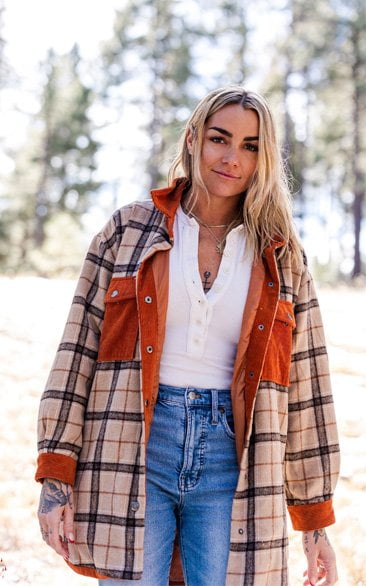

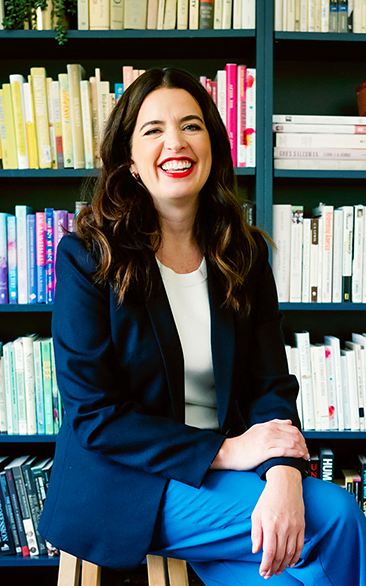








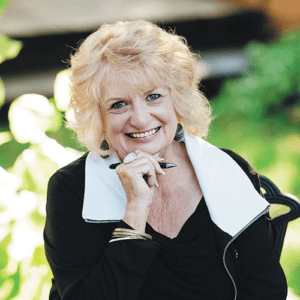
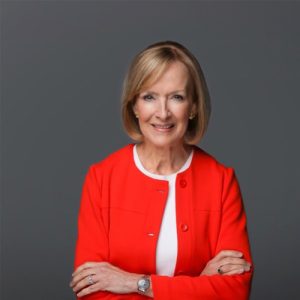
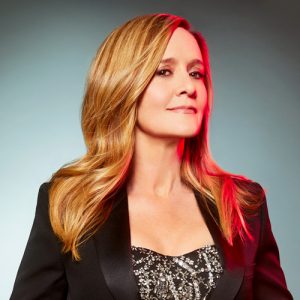
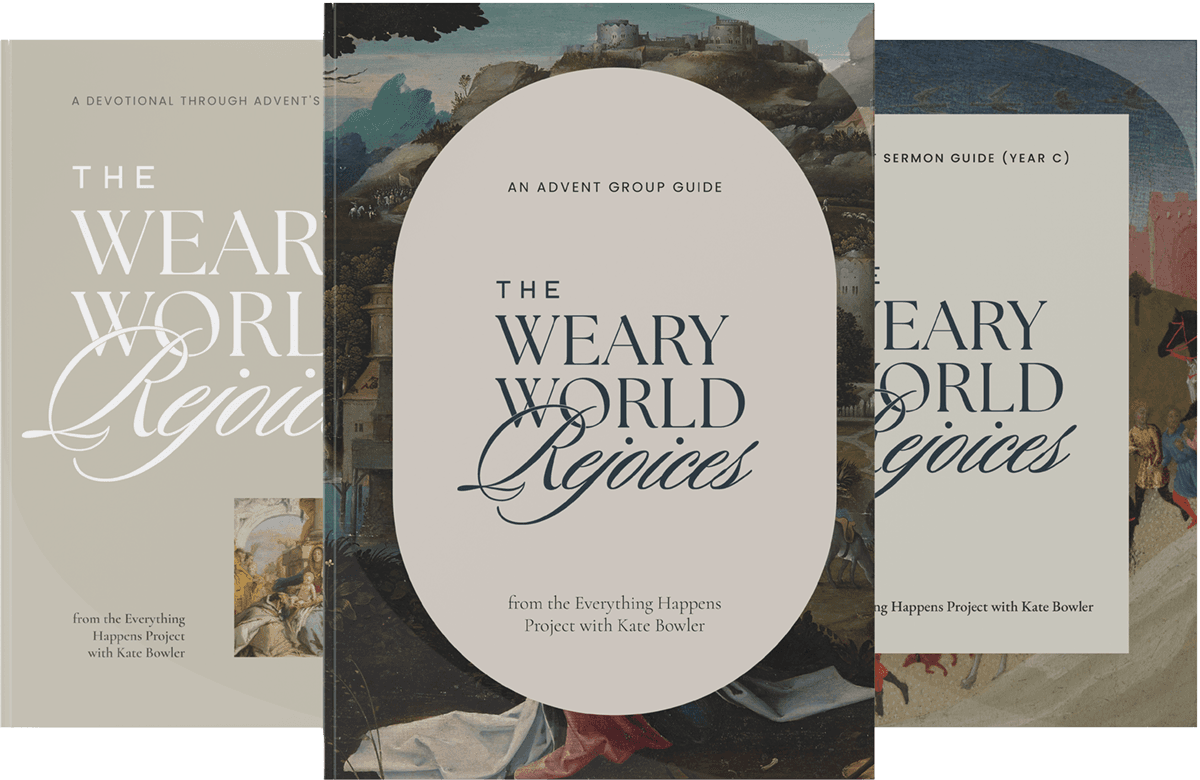
Leave a Reply